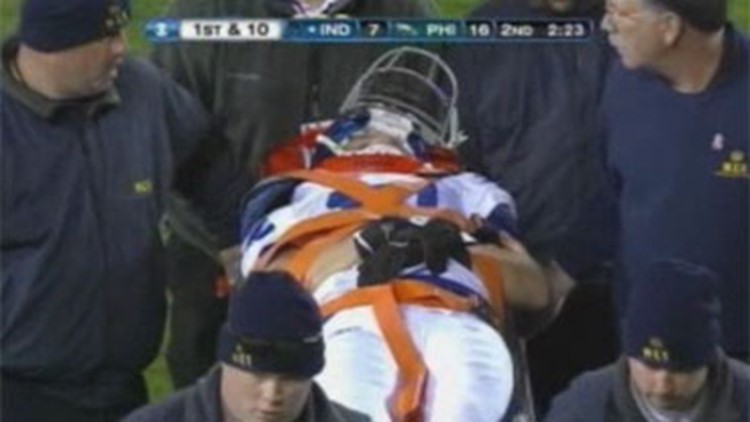Anne Marie Tiernon/Eyewitness News
Indianapolis - Colts receiver Austin Collie is now on the injured list indefinitely after a scary helmet to helmet hit during the game with the Eagles Sunday night.
Officially Austin Collie has a concussion. He likely has a headache, is dizzy and is sensitive to light and sound. This is the type of injury increasingly in the spotlight because of the long term risk to a player's health.
When Collie took the hit in the second quarter, a local neurologist who treats head injuries winced.
"I am trying to decide - was that a concussion? Was it a head injury or was it a spinal chord injury?" said Dr. Michael Sermersheim, neurologist, Josephson Wallack Munshower Neurology. "I'm still sick to my stomach when I think about it or see it. The replays are horrible."
Collie lay motionless on the field. The neck brace is standard. But the trained eye is looking for additional clues.
"When they bring the oxygen and they bring the IV then that to me says immediately it's a spinal cord injury because they sooner you give a high doze of steroids to a spinal chord injury, the better the outcome, so I watched to see if they are going to put the IV into the kid," he said.
For Collie, that wasn't the case. He was diagnosed with a concussion. He was walking around the locker room by halftime and traveled home with teammates after the game.
"In the NFL everybody has to have detailed cognitive batteries of tests. Lots of memory questions. Lots of thought. Every player has a baseline and so they have to get back to their baseline before they are allowed back out on the field," said Dr. Sermersheim.
The screening is often computerized. Doctors are looking for accuracy and speed, and the return to a baseline score varies greatly.
"It could be anywhere from two to three days to six to eight weeks or longer. We've seen professional athletes be out for six months or longer," said Dr. Sermersheim.



